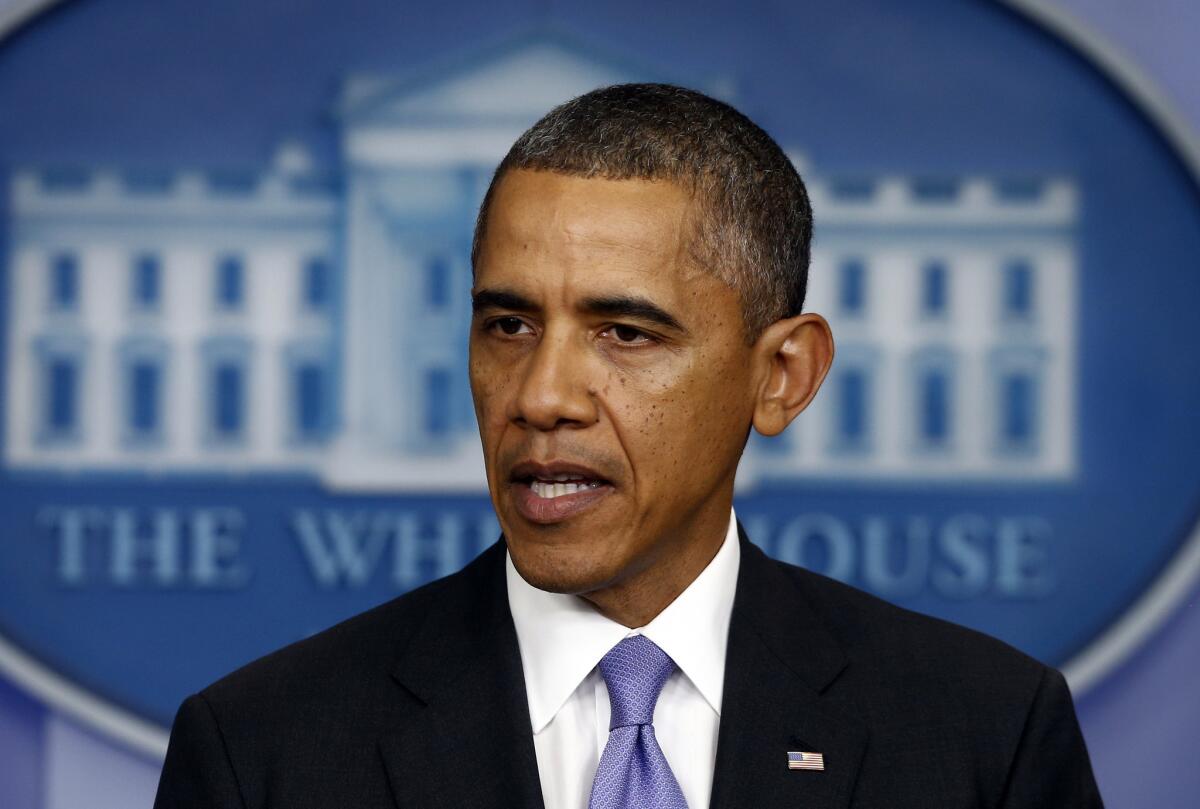Government shutdown: Plenty of lessons to go around

Obama and the Democrats won; Republicans and the tea party lost. And both sides are gearing up for next time.
Now that our recent brush with financial crisis is behind us, it’s time to start planning for the next one.
That’s the problem Congress set up in the stopgap deal that ended the 16-day government shutdown and averted a collision with the debt ceiling. After all the sound and fury, the two parties agreed only on continuing federal spending at its current level until Jan. 15 and raising the debt ceiling until Feb. 7.
PHOTOS: Tea party backlash: Protest signs to cheer you up
This was the epitome of a temporary cease-fire: An arrangement that freezes in place a situation neither side liked to begin with.
The deal didn’t solve any of the long-term fiscal worries that landed us in this mess. It didn’t even fix the sequester, the meat-ax budget cuts that hit good programs and bad ones without distinction.
Whether we can avoid a repeat performance this winter will depend on what lessons the two sides learn from the fiasco.
Let’s take the Democrats first.
“There are no winners here,” President Obama said politely Thursday morning as the government reopened.
But his aides and his allies in Congress don’t really believe that — at least, not in a practical political sense.
They think the lesson of the crisis was straightforward: Toughness works. When Obama negotiated with House Speaker John A. Boehner (R-Ohio) in 2011, he lost. The debt ceiling was raised, but Obama lost both on the substance of the issues and in the eyes of many voters. This time, when Obama dug in his heels and refused to negotiate over the debt ceiling, he won.
“Our goal was to prove to them that we were not going to engage with a gun pointed at our head,” a White House aide told me. “That’s accomplished.”
That doesn’t mean Obama won’t negotiate with Republicans in the next round. Saying he wouldn’t negotiate during the shutdown “was only a tactic; it wasn’t a basic principle,” the aide noted.
In the next round, Democrats hope to be negotiating from a better starting position. They believe Obama has shown he won’t be pushed around, and they also are hopeful that Republicans got the message they can’t use the debt ceiling as leverage any more.
“It’s kryptonite; they won’t want to touch it,” the aide predicted.
In addition, next year’s scheduled sequester cuts will slash defense spending more than this year’s, a fact that might spur Republican hawks toward a deal Democrats want to soften both defense and domestic spending cuts.
And what did Republicans learn?
To Sen. Mitch McConnell (R-Ky.), the Senate Republican leader who negotiated the stopgap deal, the lesson was that government shutdowns end badly for Republicans, and he doesn’t want to try another one. “There’s no education in the second kick of a mule,” McConnell told the conservative magazine National Review last week. “The first kick of the mule was in 1995; the second one was the last 16 days. A government shutdown is off the table. We’re not going to do it.”
Does that mean every Republican in Congress has sworn off trying to use the debt ceiling as leverage? Not necessarily.
To some of the tea party members of Congress who spearheaded the doomed strategy to demand an end to Obama’s healthcare law as the price of keeping the government open, the lesson was that their own party wasn’t tough enough.
“It was an incredible victory” at first, Sen. Ted Cruz (R-Texas) insisted in a radio interview — until more moderate Senate Republicans turned into an “air force bombing our own troops.”
But the main lesson for many GOP House members, probably a majority, was that Republicans need clearer, more achievable objectives in the next round of negotiations.
“When you have multiple objectives, you can’t have a clear strategy,” a GOP strategist told me. “The Democrats have a clear goal — they want to undo the sequester and increase tax revenues. Republicans still haven’t figured out what their goals are … [beyond] holding firm against tax increases.”
Where does that leave us as the next budget battle approaches in January?
It’s certain there won’t be a “grand bargain” that trades long-term cuts in Medicare, Medicaid and Social Security spending (Republican goals) for significant increases in tax revenue (a Democratic goal). That idea is now officially dead, at least in the short run.
Since 2014 is an election year, neither party is likely to make large concessions to the other; Republicans’ ambitions to take control of the Senate and Democrats’ hopes of taking over the House will make both sides cautious.
But it’s possible that both sides might agree to modifying the sequester — a “mini-bargain.” Both Obama and House Budget Committee Chairman Paul D. Ryan (R-Wis.) have talked about the idea of sequester “buy downs” — agreements to trade some sequester cuts for more careful spending reductions. “There’s an acknowledgment on all sides that we can’t live with the sequester,” the White House aide said.
But the most likely outcome may look more like a “micro-bargain” — another agreement to kick the can down the road, perhaps with some modest new flexibility on spending cuts.
And for a Congress that defines dysfunction, even a stopgap solution that avoids a government shutdown or a financial crisis would look almost like a victory.
Twitter: @DoyleMcManus
More to Read
A cure for the common opinion
Get thought-provoking perspectives with our weekly newsletter.
You may occasionally receive promotional content from the Los Angeles Times.







